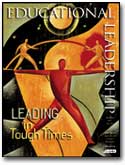The Language Police
Diane Ravitch, 2003
In the world of education textbooks and tests, there are no Irish policemen. Girls do not play house. Women are not teachers, mothers, nurses, or secretaries. Older people never use canes, wheelchairs, orthopedic shoes, or eyeglasses. A pioneer woman cannot ride in a covered wagon while a man walks. Men or boys are not seen in active, problem-solving roles.
The bias standards that rule education publishing include these edicts and hundreds of others, according to The Language Police. Author Diane Ravitch argues that these standards have made textbooks incoherent and bland. Standards instruct textbook editors to avoid stories that mention crime, divorce, religion, winter holidays, unpunished transgressions, name-calling, junk food, slavery, conflict with authority, or such controversial figures as Malcolm X. In short, anything that might offend anyone is forbidden.
How did these guidelines become so ubiquitous in the education publishing industry? Ravitch's thorough research documents a process of increasing demands from various organized pressure groups that wield enormous power over textbook sales. “By adopting textbook guidelines,” Ravitch writes, “the publishers agreed to police their products and perform the censorship demanded by the politically correct left and the religious right.”
Ravitch traces the history of textbook series that were vitiated or destroyed as their publishers vainly tried to please everyone. For example, groups on the left attacked the Holt Basic Readers, released in 1973, for their disparate treatment of the sexes and for language deemed offensive to minorities, including such phrases as “It's going to be a black winter,” and “the deputy's face darkened.” Groups on the right also attacked the series, objecting to stories that included the word “hate” or that seemed to condone lying, bad behavior, anger, or family disunity. With each subsequent revised edition, the company made “valiant” and “frantic” efforts to respond to the demands of every group. Eventually, however, the series went out of print, a “victim of a political ping-pong game” between censors on the left and right.
Although Ravitch details the absurdities promoted by both sides of the political spectrum, her in-depth critiques of modern literature and history textbooks are directed mainly at the ideology of the left. She complains that neither state nor professional content standards require students to read classical literature, and she decries the “cultural equivalence” philosophy that permeates the U.S. history and world history curriculums.
Readers may disagree with some of these conclusions and may question the short shrift that Ravitch gives to legitimate concerns about gender and racial bias in instructional materials. But anyone concerned with curriculum content and student engagement is sure to find this book a fascinating and thought-provoking read.
Published by Alfred A. Knopf, 1745 Broadway, New York, NY 10019.www.aaknopf.com. 255 pages. $24 hardback.
—Reviewed by Deborah Perkins-Gough, Senior Associate Editor, Educational Leadership

